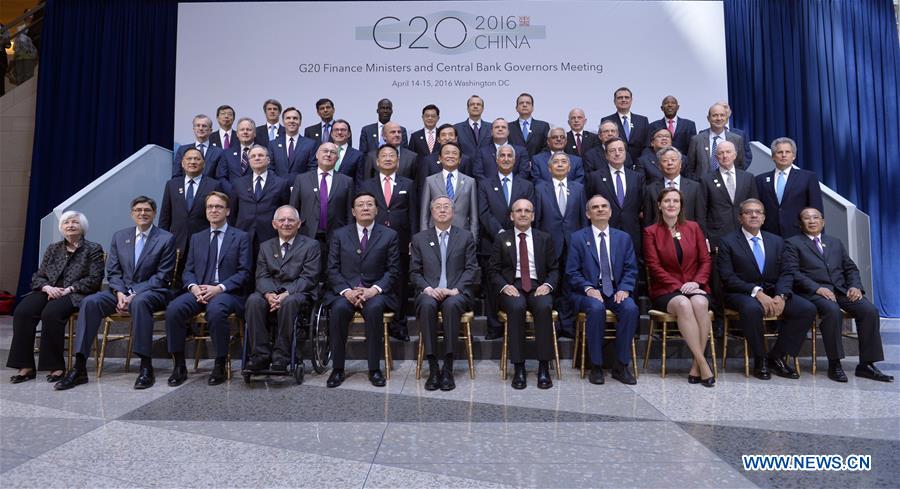

 |
| Finance ministers and central bankers of the G20 pose for a family photo after G20 meeting during the IMF and World Bank spring meetings in Washington D.C., capital of the United States, April 15, 2016.(Xinhua file photo/Yin Bogu) |
As the world economy continues to face new and tough challenges in 2016, experts envision this year's G20 summit, scheduled for September in Hangzhou, China, will play a key role in boosting world economic growth and improving global economic governance.
WORLD ECONOMY FACES CHALLENGES
The super easy monetary policies implemented in some Western countries in recent years have stagnated their reforms and stalled their economic growth.
Italy, one of the G20 members, is plagued this year by new and old problems, such as a sluggish growth, heavy debt, high unemployment, and a severe crisis in the banking sector. Currently, Italy's debt totals 2.3 trillion euros (2.63 trillion U.S. dollars), and its unemployment rate rose to 12 percent last year from 8.4 percent in 2010.
Meanwhile, Britain's and Germany's economic growth are hampered by their domestic political or social problems.
Britain will hold a referendum to decide whether it will remain within the European Union (EU) or not; the uncertain outcome of the referendum undermines confidence in Britain's, and even Europe's, economic growth.
And the refugee crisis has become the toughest problem facing Germany's economic growth, and analysts say that Germany's economic growth would suffer a further setback if the problem is not tackled properly.
The economy of the United States, a key member of the G20, is recovering, but this does not benefit all Americans. Ordinary Americans' incomes have been dropping and the wealth gap in the country is widening further.
According to statistics, real incomes of U.S. households have slid over the past 15 years, and the labor force participation rate has reached record lows over the past decades. A sustainable growth of the U.S. economy, experts say, is not guaranteed.
Meanwhile, some developing members in the G20 are seeing a reduction in imports and a shrinking manufacturing sector, due to historical factors or economic slowdowns in developed countries. And the depreciation pressure on their currencies is mounting amid an anticipated interest rate hike by the U.S. Federal Reserve.
For example, Argentina is facing a depreciation pressure as its foreign reserves slump due to sliding commodity prices on the market. As is typical for developing countries, Argentina is also experiencing an increasing fiscal deficit and swelling inflation due to its expansive fiscal policies and money supply.
The worst economic recession over the past 25 years in Brazil has also had an impact on Argentina. Argentine economist Gustavo Girado believes that most developing countries need investment and financing to make up for their trade gaps, and how to establish a more effective and broader multilateral mechanism for developing countries to resist financial risks should become a topic for this year's G20 summit.
G20 CAN HELP BOOST GLOBAL ECONOMIC GOVERNANCE
To tackle the multiple challenges, the international community needs to push ahead structural reforms and strengthen global economic governance to change the prospect of world economic growth, and the G20 can play a role in this regard by balancing the benefits and appeals of various sides, experts say.
Girado believes that although all countries recognize the importance of boosting the overall recovery of the world economy, they have their own interests and different opinions on the prospect of the world economy.
It is increasingly difficult for them to take common actions, which calls for a coordination of trade and investment policies, Girado said.
And some experts in France believe that all countries can cooperate extensively under the G20 framework, by jointly cracking down on transnational tax evasions so to reduce the loss of public finances, and jointly cracking down on money laundering and cutting off the funds of terrorist groups so as to more effectively reduce the risk of terrorist attacks.
Bhima Yudhistira Adhinegara, a researcher at Indonesia's Institute for Development of Economics and Finance, said that the G20 may help advance global trade cooperation, and Indonesia especially hopes that the G20 can push ahead for a solution to trade barriers.
The G20 will need to seek a common economic policy to help solve the economic problems of all its members, said Adhinegara.
HANGZHOU SUMMIT HIGHLY ANTICIPATED
Both Chinese and foreign experts believe that the G20 summit in Hangzhou will generate important achievements as China is a key engine for world economic growth, a participant in global economic governance and a builder of world economic order.
Experts anticipate that the G20 summit will focus on major issues in the world economy and finance, help the G20 become a long-term governance mechanism instead of just providing crisis responses, and make new contributions to boost and enhance world economic growth.
Abraham Vergara Contreras, a professor with the Ibero-American University of Mexico, told Xinhua that the greatest challenge facing the world economy today is the lack of confidence in global economic recovery, and the G20 summit in Hangzhou will be a rare opportunity for world leaders to discuss how to restore the market's confidence in economic development.
Day|Week